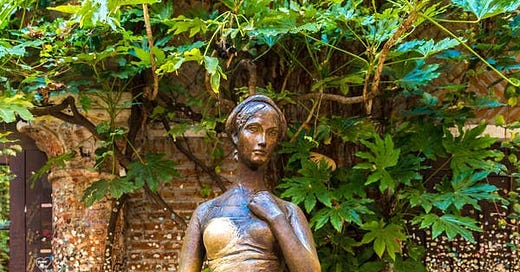We’re ensconced in Verona for a week and while you’ll be seeing our adventures exploring the Veneto regions on Traveling with Barb and Chris, I wanted to talk a bit about the city we are staying in.
Settlements go back to beyond 4000BCE and over time a small but powerful town evolved. Allied with the Romans from the mid 280s BCE, its location made it a vital crossroads and eventually the inhabitants of Verona were granted Roman citizenship, thanks primarily to the work of Julius Caesar.
Remains of the Roman period can be seen everywhere in the old city, but the most obvious example of its heritage is the Verona Arena, a Roman amphitheatre completed in 30CE. This 1995 year old building is still used today for plays, civic gatherings and concerts.
Speaking of plays, Shakespeare set two of his in Verona. “Two Gentleman of Verona” and another more obscure play, which some of you may have heard of, Romeo and Juliet.
Of the two, the city REALLY leans into Romeo and Juliet. There’s a house, Casa di Giulietta, the supposed home of Juliet, complete with a balcony (a Juliet balcony, of course) that for a fee, you can stand on and wave to the crowds in the courtyard below. The courtyard’s statue of Juliet is said to bring good luck in love and people can pose with it or rub it. Her breasts have been rubbed to a shine from all the, I suspect men, who have thought it funny to grab at a breast while having the photo taken. Did I mention that Juliet was 14? Men are pigs.
Editors Note: It is interesting that a fictious character has an actual house. Screams “Tourist Attraction”, just a bit. Also, videos of Juliet’s statue seem to show many women cozying up to her as well as men. End Note.
Rabbit Hole
I wonder how many people who have heard of Romeo and Juliet actually know how the story ends, or care? Not many, I suspect. Here’s a good and funny, but not as funny as me, article about the play.
https://www.thoughtlab.com/blog/dear-paul-why-is-romeo-and-juliet-so-popular/
End Rabbit Hole
Researching this I discovered that a new film version of Romeo and Juliet has been completed, it’s a “pop” music version (although I suspect 2025 “pop” music may be different from what I call pop music) but its aimed at the younger audience and not me, so my idea of pop music surely doesn’t count. The version is being released in theatres this summer, called Juliet and Romeo. I’m sure that clever name swap will confuse teens into the theatre, where they will not realize they are watching Shakespeare.
One cute movie is “Letter to Juliet” about a young woman who is part of a group who answers letters left on the wall of the courtyard, for Juliet.
For a week around February 14, every year, Verona hosts the “Verona in Love” festival. During this celebration, the city turns into a rom-com set, complete with street art, singing, and enough heart-shaped decorations to, well, fill a city.
Verona likes to throw a party. The Verona Opera Festival turns the Arena into a stage for performances under the stars. Christmas transforms the city into a festive wonderland, complete with markets, nativity scenes, and enough twinkling lights to make Santa proud, which too be honest, isn’t unique to Verona. Italy at Christmas is a pretty special place to be.
Then there’s the Carnival of Verona, where parades, masks, and *gnocchi di carnevale* take center stage. This pre-Lenten bash is basically an excuse to eat a lot and dance even more—because who needs restraint with Lent coming up?
Besides the Verona Arena, the is Castelvecchio (“Old Castle”) which sits on the bank at the bend in the Adige river and has been the site of numerous fortifications over the millennia. The city also boasts numerous medieval churches and piazzas, as well as its own local cuisine, which includes rice balls made with wine and a dish I will NOT try, a horsemeat stew.
We’ll write more about Verona on our Traveling with Barb and Chris page, so consider this simply a little appetizer. A soupçon of scintillating…facts. So much for alliteration.
Until next time.




